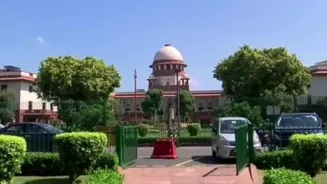The Supreme Court on Tuesday engaged in a sharp exchange with Tamil Nadu’s counsel over the state’s push for “deemed assent” — a provision that would treat
bills left pending by governors as approved. Appearing for Tamil Nadu during the hearing on the Presidential reference on the powers of governors case, senior advocate AM Singhvi argued that governors in several states have been sitting over bills for months or even years, which undermines the constitutional principle that sovereignty lies with the people. He urged the court to lay down a general timeline for governors to decide on bills. “Keeping bills pending without any reason by Governor is distortion of constitutional scheme of governance,” Singhvi submitted. A five-judge bench led by Chief Justice B R Gavai asked: “If we can do this, why can't we step into the governor's shoes to order a bill's return to the legislature and also reserve it for President's consideration?” The bench pressed further, with CJI Gavai and Justice Vikram Nath asking: “If governors do not comply with the SC-fixed timeline, what would be the consequence?” Singhvi replied that the only workable safeguard would be to provide for deemed assent — treating a bill as passed if the governor does not act — in order to avoid invoking contempt powers.
'Deemed Assent Carries Dangerous Implications': SC Warns
But Justice Nath warned against such a step, saying Singhvi’s proposal carried “dangerous implications.” He reminded the court that Article 200 of the Constitution already provides four options to a governor: granting assent, withholding assent, sending the bill back with suggestions, or reserving it for the President’s consideration. “If SC can grant deemed assent to long-pending bills, what prevents it from stepping into a governor’s shoes to exercise the options,” he asked.
Singhvi maintained his ground. “SC judges are not sitting in ivory towers. They know the ground reality. When bills are kept pending for years and when the governor’s action cannot be questioned in a constitutional court, then the governor arrogates himself with unfettered power to kill a bill, and with it the will of the people, by simply keeping it pending. He, thus, becomes a super CM with a pocket veto, and the elected government would be a mere bystander,” he said.
Drawing a parallel, Singhvi pointed out that the Supreme Court has in the past fixed timelines for speakers under the Tenth Schedule to decide disqualification petitions against MLAs.
The CJI, however, pushed back, recalling Singhvi’s own submissions in the Telangana case. “In the Telangana case, it was Singhvi who had argued that SC cannot fix a timeline for speakers. We rejected that argument and asked the speaker, who acts as a tribunal in dealing with petitions under the anti-defection law, to decide it within three months,” CJI Gavai noted.
He further reminded that the judgment, authored by him on July 31, deliberately avoided creating a general timeline for all speakers. “We left it to Parliament to consider whether the mechanism of entrusting speakers with the important task of deciding the issue of disqualification on the ground of defection is serving the purpose of effectively combating political defection or not?”
As Singhvi cited examples of governors stalling bills, Solicitor General Tushar Mehta interjected sharply: “If he wants to give such examples it will be taking a dirty path. I have no objection and I am ready to charter that path also. I will file an affidavit showing how the Constitution was taken on a joy ride since Independence. Do we want to go that path?”
Making its position clear, the bench said: “We will not be guided by what governors did in individual states like Tamil Nadu, Kerala or Karnataka. We will deal with the Presidential Reference constitutionally and answer the queries on their own merit.”
The matter will resume on Wednesday.
(With inputs from agencies)





















